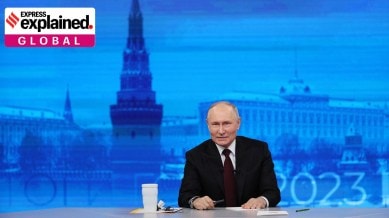What Vladimir Putin wants from the Ukraine War
In his first end-of-year news conference since the war in Ukraine began in 2022, Russian President Vladimir Putin said that his country’s goals remain “unchanged” and there will be no peace till they are achieved.

Russian President Vladimir Putin said on Thursday (December 14) that there will be no peace in Ukraine until Russia achieves its goals, which remain unchanged after nearly two years of heavy fighting.
“There will be peace when we will achieve our goals… Victory will be ours” Putin said, speaking at his first end-of-year news conference since the invasion began in February 2022.
monthly limit of free stories.
with an Express account.
What are these stated goals? And what do Putin’s strong statements signal?
“Denazification, demilitarisation and a neutral status”
Putin’s Thursday statement repeated what the Kremlin has maintained from the very beginning — that peace will only be possible after the “denazification, demilitarisation, and neutral status” of Ukraine is achieved.
Russia has long claimed that Ukraine’s government is heavily influenced by radical nationalist and neo-Nazi groups, a claim which Ukraine and the West deny.
In the context of Russia’s nationalist imagination of World War II, where the Soviets stood strong against Nazi Germany, such a claim is deeply resonant with the masses and helps generate support for the war. “Defending the Motherland when its fate is being decided has always been sacred,” Putin said in May last year.
The objectives of demilitarisation and a neutral status for Ukraine, however, are more strategic in nature. Many observers believe that the immediate trigger behind Russia’s invasion was Ukraine’s increasing closeness with NATO, and the possibility that it joined the United States-led military coalition.
“The unbridled desire to creep towards our borders, taking Ukraine into NATO, all this led to this tragedy … They forced us into these actions,” Putin said on Thursday. “Either we agree or we need to resolve [the issue] by force,” he added.
A show of strength
Putin, on Thursday, appeared before 600 journalists-odd journalists, including about a dozen Western correspondents, in his annual end-of-year conference. He also answered called-in questions from people across Russia. While a lot of the event revolved around Ukraine, Putin spoke on a wide range of topics, from the situation in Gaza, to the price of eggs in Russia.
“A glitch in the work of the government,” Putin apologetically told the old woman raising the eggs complaint, adding that “the central bank and government are taking necessary measures” to combat inflation.
This used to be a yearly tradition for Putin, and an exercise in making him seem accessible to the Russian people. Last year, however, as Russia’s war effort faltered and public dissatisfaction grew, Putin ditched this event, for the very first time in his tenure. Thus, his decision to hold it this year probably signals where the winds of war are currently blowing, with Ukraine quickly running out of men and money to continue the war effort.
Moreover, this event comes just days after the 71-year old announced that he will run for a fifth term in next year’s election — which he is almost certain to win. This would see him remain president till 2030, three decades after he first assumed power at the turn of the millennium.
Interestingly, if he does end up serving for another full term, by 2030 he would become the longest-serving Russian leader since Empress Catherine the Great in the 18th century, surpassing all the Soviet rulers, including Josef Stalin.
(With inputs from the Associated Press and the New York Times)